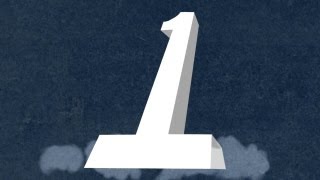(单词翻译:单击)
Which is correct: 'A dozen eggs is?' Or 'A dozen eggs are?'
哪个是正确的:a dozen eggs is还是a dozen eggs are?
I remember being in elementary school, and my teachers making a big deal about the unit.
我记得当我在小学的时候,我们老师教了很多有关的数量单位词。
And I never really got that, until one day, I was in the grocery store,
但我从没有学会,直到有一天我到杂货店,
and I wanted to buy an apple, but I couldn't buy one apple.
我想买一颗苹果(an apple),不过我却不能买“一”苹果(one apple)。
I had to buy a whole bag of apples. So I did.
这表示我必须买一整袋的苹果。所以我做了。
I bought one bag of apples, I took it home, I took one apple out of the bag, and I cut it up.
我买了一整袋的苹果,我把它拿回家,我从袋子拿出一颗苹果并切开。
And then I ate one slice. One bag, one apple, one slice.
然后吃了一片。一袋、一颗、一片。
Which of these is the real 'one'?
哪一个才是真实的那一个?
Well, they all are of course, and that's what my elementary teachers were trying to tell me.
好吧,他们当然都是,而且那正是我小学老师一直试着告诉我的。
Because this is the important idea behind whole number place value, decimal place value and fractions.
因为这是一个关于整数字、小数点位与分数的重要的概念。
Our whole number system depends on being able to change what we count as 'one'.
我们所使用的数字系统要能够转换我们所熟悉的“一”。
Our whole number system depends on being able to change units.
我们所使用的数字系统要能够转换“单位”。
There are two ways to change units. We can compose, and we can partition.
有两个方式能够转换单位。我们可以组合,也可以分割。
When we compose units, we take a bunch of things, we put them together to make a bigger thing, like a dozen eggs.
当我们组合多个单位时,我们把一大堆的东西放在一起,让他们变成更大的东西,就像一打鸡蛋一样。
We take 12 eggs, put them together to make a group, and we call that group a dozen.
我们把十二颗鸡蛋放在一起,组合成一组,然后我们叫这一组“一打”。
A dozen eggs is a composed unit.
一打鸡蛋就是一种组合单位。
Other examples of composed units include a deck of cards, a pair of shoes, a jazz quartet
其他组合单位的例子还包括:一副牌、一双鞋、爵士四重奏,
and of course, Barbie and Ken make a couple.
当然还有,芭比和肯尼组合成一对情侣。

But think about a loaf of bread. That's not a composed unit,
但想想看一条面包。那不是一种组合单位,
because we don't get a bunch of slices from a bunch of different bakeries and put them together to make a loaf.
因为我们不会从不同的面包店拿一片片切好的面包,将它们放在一起变成一条面包。
No, we start with a loaf of bread and we cut it into smaller pieces called slices,
不是这样,我们是把一条面包切成更小的面包,并叫它“一片”面包,
so each slice of bread is a partitioned unit.
所以每一片面包就是一个分割单位。
Other examples of partitioned units include a square of a chocolate bar,
其他分割单位的例子包括:一条巧克力棒、
a section of an orange and a slice of pizza.
一片柳橙,还有一张披萨。
The important thing about units is that once we've made a new unit,
重要的是,一旦我们创造新的单位,
we can treat it just like we did the old unit.
我们就能用跟旧的单位同样的方法来使用它。
We can compose composed units, and we can partition partitioned units. Think about toaster pastries.
我们可以组成组合单位,也可以分成分割单位。想想看那些零食。
They come in packs of two, and then those packs get put together in sets of four to make a box.
他们两片包成一袋,然后再把四袋放在一起,变成一盒。
So when I buy one box of toaster pastries, am I buying one thing, four things, or eight things?
所以当我买一盒零食时,我是买了“一个”、“四个”、还是“八个”?
It depends on the unit. One box, four packs, eight pastries.
这取决于单位。一盒、四袋、八片。
And when I share a slice of pizza with a friend, we have to cut 'it' into two smaller pieces.
当我跟我的朋友分享一张披萨,我们必须将它切成更小的两张。
So a box of toaster pastries is composed of composed units,
所以一盒零食是一个组合单位的组成,
and when I split a slice of pizza, I'm partitioning a partitioned unit.
而当我切开一张披萨时,我正在切出一个分割单位。
But what does that have to do with math? In math, everything is certain.
但这些到底跟数学有什么关系?数学中,所有东西都是确定的。
Two plus two equals four, and one is just one.
2+2=4,1就是1。
But that's not really right. One isn't always one.
但那不全然正确。1不一定永远是1。
Here's why: we start counting at one, and we count up to nine:
这就是原因:我们从1开始数,一直数到9
1, 2, 3, 4, 5, 6, 7, 8, 9, and then we get to 10,
1、2、3、4、5、6、7、8、9,接下来我们数到10了,
and in order to write 10, we write a one and a zero.
而为了写下10这个数字,我们写了一个1和一个0。
That one means that we have one group, and the zero helps us remember that it means one group, not one thing.
其中的1就表示我们有了一个群组,而0帮助我们记得这是指一组,而不是一个。
But 10, just like one, just like a dozen eggs, just like an egg, 10 is a unit. And 10 tens make 100.
但是10,就像1,就像一打鸡蛋,就像一颗鸡蛋,10是一个单位。而十个10变成100。
So when I think about 100, it's like the box of toaster pastries.
所以当我们在想100是什么的时候,它就像那一盒零食。
Is 100 one thing, 10 things or 100 things?
100是一个东西?10个?或是100个?
And that depends on what 'one' is, it depends on what the unit is.
那就取决于那个“一”是指什么,也就是单位是什么。
So think about all the times in math when you write the number one.
所以碰到数学需要写“一”的时候,要一直想着这件事。
No matter what place that one is in, no matter how many things that one represents, one is...
不管这个“一”是放在哪个位置,不管这个“一”里有多少东西,“一”就是...


